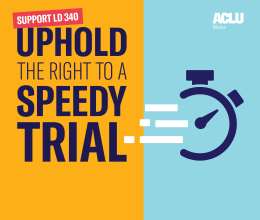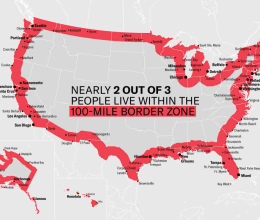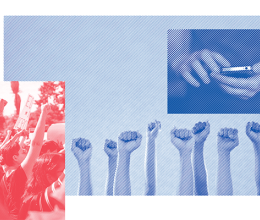“Bail has only one purpose - to ensure that a person accused of a crime will appear in court for his trial. We presume a person to be innocent until he is proven guilty, and thus the purpose of bail is not punishment. It is not harassment. It is not to put people in jail. It is simply to guarantee appearance in court. This is a legitimate purpose for a system of justice. In practice, though, bail has become a vehicle for systematic injustice. Every year in this country, thousands of persons are kept in jail for weeks and even months following arrest. They are not yet proven guilty. They may be no more likely to flee than you or I. But, nonetheless, most of them must stay in jail because, to be blunt, they cannot afford to pay for their freedom.”
-U.S. Attorney General Robert F. Kennedy, August 4, 1964
On any given day, the majority of people in Maine jails are there awaiting trial. In eight of the 15 county jails, the pretrial population exceeds 70 percent; in two (Androscoggin and Oxford Counties), more than 80 percent of the total population is being held pretrial. Our own analysis of the data found that at least 40,000 people, and likely more, are incarcerated pretrial in Maine jails each year.
And, the majority of those people are there for misdemeanor charges. In fact, more than half of all jail bookings in Maine are for “offenses against public order and public administration,” which include failure to appear for a court date, violations of conditions of release (e.g., possession of alcohol or curfew violations), failure to pay fines, and disorderly conduct. Failure to appear for a court date and violation of conditions of release are among the five most common offenses that defendants are charged with in every Maine jail for which we have data.
Most of the offenses for which pretrial defendants in Maine are charged do not represent the kind of serious threat to public safety that would require the extraordinary step of detention before trial. Depriving a person of their liberty before trial is an extreme measure that should be reserved for the most extreme circumstances. Instead, we are locking up tens of thousands of people because they are poor.
The bail system was meant to keep most people out of jail before trial – to ensure that pretrial defendants were not held in jail before their court dates, suffering punishment for crimes of which they had not been convicted. But Maine’s bail system is failing. It has become a tool of detention rather than freedom. As a result, our jails are overcrowded, families are torn apart, Maine’s economy suffers, and we are not any safer for it.
This broken system is enormously expensive. Taxpayers foot the bill for feeding, housing and securing someone in state custody, and rising jail populations mean rising costs. Low-end estimates put the cost to taxpayers for each person in jail at $100 per day; in total Mainers spent $87 million on our jails in 2017.
Further, pretrial detention undermines the integrity of the judicial system. Studies show that defendants who can’t afford bail are more likely to plead guilty, even to crimes they did not commit, so that they can get out of jail faster.
Finally, pretrial incarceration exacts an immeasurable human toll. Spending even one day in jail can have a devastating effect on people’s lives. Mainers held pretrial are at risk of losing their jobs, losing their homes, losing custody of their children, losing their health insurance, and losing access to treatment for mental illness and substance use – all because they were held in jail before trial because they couldn’t afford to pay their cash bail.
On top of all that, bail is not even good at the job it is supposed to do – ensure people return for their court dates. According to the Maine Intergovernmental Pretrial Justice Reform Task Force, “[t]here is no difference in terms of subsequent appearance rates at the court between defendants who are released on unsecured bail vs. those released on secured bail.” And, “[t]here is no difference between defendants who are released on unsecured bail vs. those released on secured bail in terms of whether a defendant commits a subsequent offense while released on bail.” Instead, research shows that court date reminders are far more effective, at far less cost to our liberty, than cash bail.
The good news is that Maine has the opportunity to do better. Substantive reforms in our bail system can improve the criminal justice system for everyone and save the state money. While the overall problems with Maine’s pretrial system are manifold, and successful change will require comprehensive reform at every juncture of the system, this report focuses on a few straightforward solutions to the bail system that are within reach.
By re-establishing pretrial release as the norm, monitoring bail practices through data collection, and using a court date notification system to ensure defendants show up to their court dates, Maine can significantly reduce pretrial incarceration while simultaneously improving community safety and court appearance rates.










